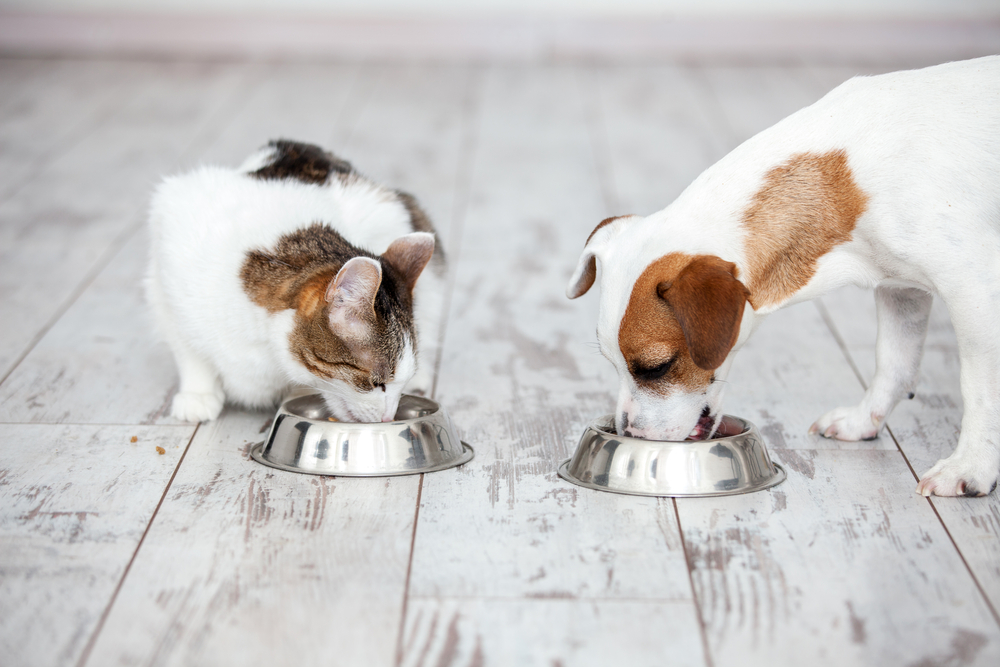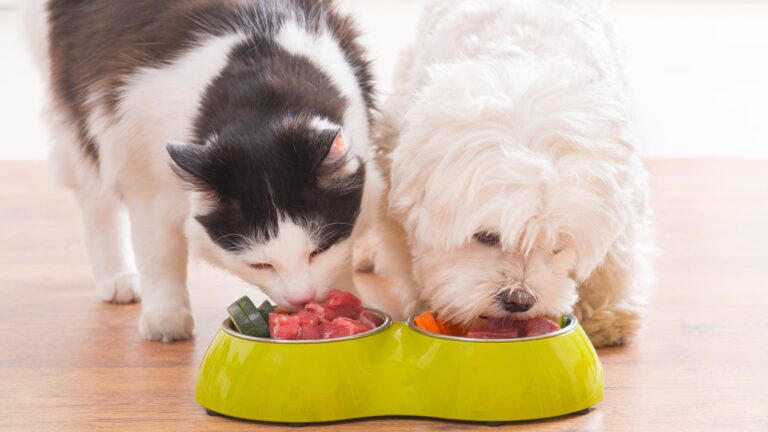Yes, it is safe for dogs to eat cat food occasionally, but it should not be a regular practice. Cat food lacks essential nutrients that dogs need in their diet, so it can’t be a substitute for dog food.
Dogs may find cat food appealing, but it is formulated to meet the specific nutritional needs of cats, including higher protein and fat content. Over time, consuming cat food can lead to nutritional imbalances in dogs, causing health problems such as obesity, pancreatitis, and other digestive issues.
Therefore, it’s best to feed dogs food specifically designed for their dietary requirements. Always consult with a veterinarian for guidance on a proper diet for your dog to ensure their health and well-being.
:strip_icc()/GettyImages-1137504605-4ea3ceec185f4d1e9dc39fb71f8ae04c.jpg)
Credit: www.thesprucepets.com
The Difference Between Dog Food And Cat Food
Dog food and cat food are formulated specifically for each species’ nutritional needs. While occasional consumption of cat food may not harm dogs, it is not safe for long-term consumption as it lacks essential nutrients for dogs’ overall health.
When it comes to the diets of our furry friends, it’s crucial to understand the difference between dog food and cat food. While both types of food are designed to provide essential nutrients, they are formulated to meet the specific nutritional needs of each species.
Nutritional Needs Of Dogs
Dogs are classified as omnivores, which means they can thrive on a diet that includes both plant and animal-based ingredients. They require a balance of proteins, carbohydrates, fats, vitamins, and minerals to support their overall health and well-being.
Key nutritional needs of dogs include:
| P | High-quality proteins (from sources like chicken, beef, and fish) that support muscle development and repair |
| C | Carbohydrates (such as rice and sweet potatoes) that provide energy for daily activities |
| F | Healthy fats (like those found in fish oil and chicken fat) that promote a shiny coat and help with nutrient absorption |
| V | Vitamins and minerals (including vitamin A, vitamin D, calcium, and phosphorus) that support various bodily functions |
Nutritional Needs Of Cats
Cats, on the other hand, are obligate carnivores, meaning their bodies are designed to primarily derive nutrients from animal-based sources. Their nutritional needs are different from dogs, as they require a higher amount of certain nutrients, such as protein and certain vitamins and minerals.
Key nutritional needs of cats include:
- P
- High-quality animal proteins (like those found in poultry and fish) that are necessary for optimal growth, maintenance, and repair of tissues
- F
- Healthy fats (such as those found in fish oil and chicken fat) that provide energy and support skin and coat health
- V
- Specific vitamins and minerals (including vitamin A, taurine, and arachidonic acid) that are essential for their overall health
Key Differences Between Dog And Cat Food
Understanding the specific nutritional needs of dogs and cats helps explain why there are distinct differences between dog food and cat food formulas.
Some of the key differences include:
- Dog food typically contains a balanced mix of proteins, carbohydrates, fats, vitamins, and minerals appropriate for dogs’ needs.
- Cat food contains higher levels of protein and certain vitamins and minerals that are vital for cats.
- Cat food also includes taurine, an amino acid that is essential for cats but does not possess the same importance for dogs.
- The fat content in cat food is usually higher than in dog food, reflecting cats’ higher energy requirements.
- Cat food may also have different texture and shapes, as cats typically have smaller mouths and teeth compared to dogs.
It’s important to note that while occasional nibbles of cat food may not harm your dog, it should not be a regular part of their diet. Feeding your dog cat food exclusively can lead to nutritional imbalances and potential health issues in the long run. Thus, it’s vital to provide your pets with food that caters to their specific needs.
Potential Risks Of Dogs Eating Cat Food
When it comes to the topic of whether it is safe for dogs to eat cat food, it’s important to consider the potential risks associated with this practice. Despite the occasional indulgence not causing harm, frequent consumption of cat food can have detrimental effects on dogs’ health.
Digestive Upset
Dogs have unique nutritional needs that differ from those of cats, and cat food is formulated specifically for felines. When dogs eat cat food, it can lead to digestive upset such as diarrhea, vomiting, and gastrointestinal discomfort. The higher protein and fat content found in cat food compared to dog food can cause digestive issues for dogs, particularly if consumed regularly.
Obesity And Weight Gain
Obesity and weight gain are common concerns associated with dogs consuming cat food. The high calorie and fat content in cat food can lead to excessive weight gain in dogs, especially if they have unrestricted access to it. This can lead to a myriad of health problems, including diabetes, joint issues, and decreased life expectancy.
Nutritional Imbalances
Feeding on cat food can also result in nutritional imbalances for dogs. Cat food does not contain the essential nutrients dogs need to thrive, such as adequate levels of vitamin E, taurine, and specific types of fats. Over time, this imbalance can lead to severe health issues and malnutrition.
Health Concerns Associated With Cat Food Ingredients
Cat food may look like a tempting treat for your dog, but it’s important to understand the potential health concerns associated with cat food ingredients. While it’s not toxic for dogs to eat cat food occasionally, repeated consumption can lead to nutritional imbalances and health issues. Below, we’ll discuss the health concerns associated with cat food ingredients that can impact your dog’s well-being.
High Protein Content
Dogs and cats have different dietary needs, and cat food is often higher in protein content than what dogs require. Excessive protein consumption can strain your dog’s kidneys and liver, leading to potential health issues over time.
Taurine Deficiency
Many cat foods contain higher levels of taurine, an amino acid essential for feline health. While dogs can produce taurine naturally, prolonged consumption of cat food may disrupt this natural balance, possibly leading to taurine deficiency in dogs.
Too Much Vitamin A
Cat food is often formulated with higher levels of vitamin A, which could surpass the recommended daily intake for dogs. Overconsumption of vitamin A can result in bone and joint problems, as well as potential toxicity in dogs.

Credit: www.vets-now.com
Tips To Prevent Dogs From Eating Cat Food
Dog owners often wonder if it’s safe for their furry pals to eat cat food. Here are some helpful tips to prevent dogs from indulging in their feline companion’s meals. Keep the cat food out of reach, feed your pets separately, and consider using a baby gate or closed door to separate their areas during mealtime.
1. Separate Feeding Areas
One effective way to prevent dogs from eating cat food is to establish separate feeding areas for your dog and cat. Cats require specific nutrients that may not be suitable for dogs, so it is important to keep their food separate. This can easily be done by providing each pet with their own designated feeding space.
Placing your cat’s food in an area that your dog cannot access, such as on a high shelf or behind a closed door, will help keep your furry friend from indulging in the cat’s kibble. This ensures that your cat gets the appropriate nutrition without the risk of your dog stealing their food.
2. Supervise Meal Times
Another key tip to prevent dogs from eating cat food is to closely supervise meal times. This means being present during feeding times and making sure that your dog doesn’t have the opportunity to sneak into the cat’s eating area. By keeping a watchful eye, you can quickly intervene if your dog tries to access the cat’s food.
Try to establish a routine where you feed your pets at specific times and in separate locations. This way, you can be present to separate your dog from the cat’s food and ensure that each pet gets their own meal. It may also be helpful to feed your pets in separate rooms or use dividers to create physical barriers.
3. Use Pet Gates Or Barriers
Pet gates or barriers can be a useful tool in preventing dogs from accessing cat food. These physical barriers can be installed in doorways or other areas to keep your dog out of specific rooms or spaces where the cat’s food is located.
You can utilize adjustable pet gates that easily attach to door frames or invest in freestanding barriers that can be placed strategically. These barriers effectively limit your dog’s access, ensuring that only the intended pet can reach their food. It’s important to choose sturdy barriers that your dog cannot easily knock down.

Credit: www.youtube.com
Frequently Asked Questions Of Is It Safe For Dogs To Eat Cat Food
Can Dogs Eat Cat Food?
Yes, dogs can eat cat food, but it is not recommended. Cat food is formulated specifically for cats and lacks the essential nutrients dogs need in their diet. Consuming cat food regularly can lead to health issues like obesity and malnutrition in dogs.
It’s best to stick to a balanced and nutritionally complete diet designed for dogs.
What Happens If A Dog Eats Cat Food?
If a dog eats cat food occasionally, it may not cause any harm. However, consuming cat food regularly can lead to nutritional imbalances in dogs. The high levels of protein and fat in cat food can put strain on a dog’s digestive system and lead to digestive upset, obesity, and other health issues.
Why Should Dogs Not Eat Cat Food?
Dogs should not eat cat food because it lacks the necessary nutrients for a balanced canine diet. Cat food is higher in protein and fat, which can cause weight gain and strain the dog’s liver and kidneys. Additionally, cat food may contain certain ingredients that are toxic to dogs, such as onions or garlic.
Is It Safe For Dogs To Have Small Amounts Of Cat Food?
In small amounts, cat food may not be harmful to dogs. However, it should not be a regular part of their diet. The high protein and fat content can cause digestive issues and obesity over time. It’s best to provide dogs with a nutritionally complete and balanced diet specifically formulated for their needs.
Conclusion
To conclude, while it may be tempting to let your dog indulge in some cat food every now and then, it is important to prioritize their health and well-being. Cat food lacks the essential nutrients that dogs require, and can lead to various health issues.
Ensure that you feed your dog a balanced diet specifically formulated for their needs, and consult your veterinarian for guidance. Your furry friend will thank you in the long run!



